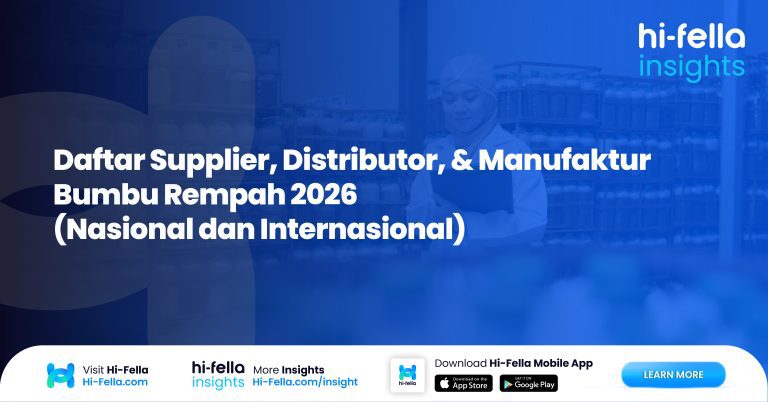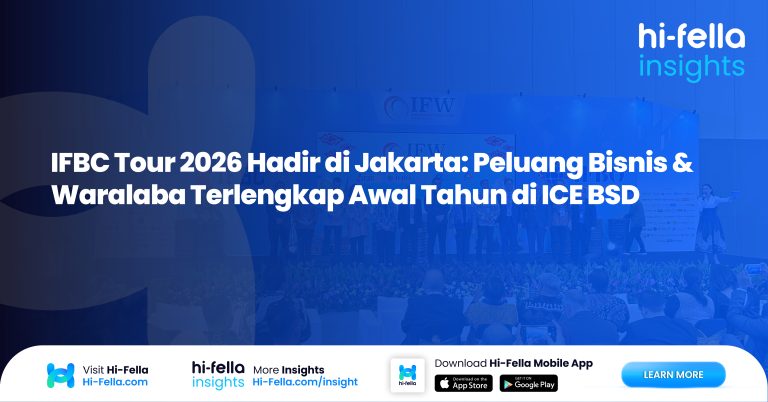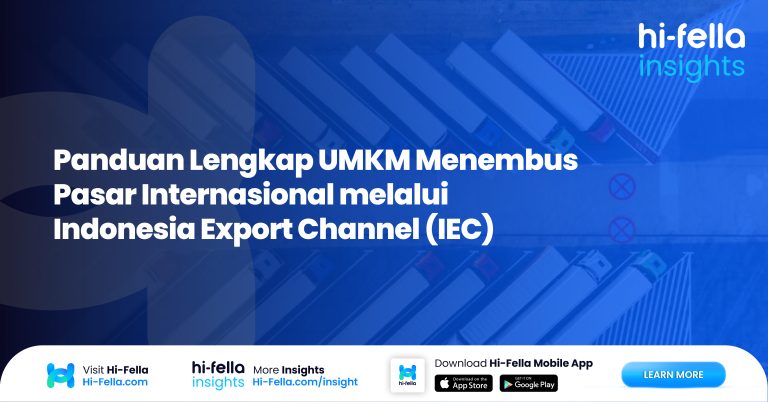Secara historis, pasar telah menjadi tempat pertemuan antara pembeli dan penjual untuk transaksi. Dengan perkembangan zaman, muncul berbagai jenis pasar, termasuk pasar internasional yang menawarkan cakupan global.
Lantas, apa itu pasar internasional? Bagaimana karakteristik dan tantangannya? Berikut penjelasan lengkapnya!
Apa Itu Pasar Internasional

Sumber: Vibiznews
Jawaban dari pertanyaan apa itu pasar internasional merujuk pada pertukaran barang, jasa, dan modal antara negara-negara di seluruh dunia.
Ini mencakup semua aktivitas komersial yang melibatkan transaksi lintas batas, dari ekspor dan impor hingga investasi asing langsung dan e-commerce lintas negara.
Pasar internasional memungkinkan perusahaan untuk memperluas jangkauan mereka, mengakses sumber daya baru, dan berkompetisi dalam skala global.
Karakteristik Pasar Internasional
Setelah mengetahui apa itu pasar internasional, penting juga mengetahui apa saja karakteristik pasar internasional yang membedakannya dari pasar domestik, yaitu sebagai berikut:
1. Keragaman Budaya
Pelaku pasar harus memahami dan menghormati perbedaan budaya, norma, dan preferensi konsumen di berbagai negara.
2. Perbedaan Regulasi
Setiap negara memiliki hukum dan regulasi perdagangan sendiri, yang dapat mempengaruhi cara perusahaan beroperasi di pasar internasional.
3. Fluktuasi Mata Uang
Nilai tukar mata uang yang berubah-ubah dapat mempengaruhi harga, laba, dan strategi penetapan harga.
4. Kompetisi Global
Perusahaan menghadapi persaingan dari baik pemain lokal maupun internasional, yang mendorong inovasi dan efisiensi.
Peran Pasar Internasional dalam Ekonomi Global
Pasar internasional memainkan peran penting dalam ekonomi global, mempromosikan pertumbuhan ekonomi, penciptaan lapangan kerja, dan inovasi.
Perdagangan lintas batas memungkinkan negara-negara untuk mengkhususkan diri dalam produksi barang dan jasa di mana mereka memiliki keunggulan komparatif, meningkatkan efisiensi global dan memperkaya pilihan konsumen.
Manfaat Mengikuti Pasar Internasional

Sumber: Pexels
Memahami apa itu pasar internasional dan memanfaatkannya dengan baik dapat memberikan keuntungan yang cukup besar bagi perusahaan yang berambisi untuk berkembang di luar batas geografis mereka.
Berikut adalah penjelasan lebih komprehensif tentang manfaat utama yang dapat diperoleh perusahaan dengan terlibat dalam pasar internasional:
1. Akses ke Pasar Baru
Salah satu daya tarik utama pasar internasional adalah akses yang diberikannya ke pasar baru. Dengan memasuki pasar internasional, perusahaan tidak hanya memperluas jangkauan geografis mereka tetapi juga mendapatkan akses ke pelanggan baru yang dapat meningkatkan penjualan dan pertumbuhan pendapatan.
Mengerti apa itu pasar internasional berarti mengakui peluang untuk memperkenalkan produk atau layanan Anda ke audiens yang lebih luas, yang mungkin belum terjamah oleh pesaing Anda.
2. Skala Ekonomi
Partisipasi dalam pasar internasional memungkinkan perusahaan untuk mengoperasikan pada skala yang lebih besar, yang seringkali mengarah pada efisiensi produksi yang lebih tinggi dan pengurangan biaya per unit.
Dengan meningkatkan volume produksi untuk memenuhi permintaan global, perusahaan dapat memanfaatkan ekonomi skala.
Hal ini tidak hanya menurunkan biaya operasional tetapi juga memberikan keunggulan kompetitif dalam penetapan harga, memungkinkan perusahaan untuk lebih kompetitif di pasar internasional dan domestik.
3. Diversifikasi Risiko
Diversifikasi geografis melalui pasar internasional merupakan strategi efektif untuk mengurangi risiko bisnis.
Dengan mengoperasikan di berbagai pasar, perusahaan dapat mengurangi ketergantungan pada satu pasar tunggal, yang mungkin terpengaruh oleh fluktuasi ekonomi, politik, atau bencana alam.
Dengan memahami apa itu pasar internasional dan bagaimana cara kerjanya, perusahaan dapat memitigasi risiko dengan menyebarkan operasinya di berbagai wilayah dan dapat memastikan bahwa gangguan di satu pasar tidak akan berdampak fatal terhadap keseluruhan operasional bisnisnya.
Tantangan dalam Beroperasi di Pasar Internasional
Meskipun menawarkan banyak peluang, pasar internasional juga menimbulkan tantangan unik, seperti:
1. Hambatan Bahasa dan Budaya
Salah satu tantangan paling signifikan dalam beroperasi di pasar internasional adalah mengatasi hambatan bahasa dan budaya.
Memahami apa itu pasar internasional berarti mengakui pentingnya komunikasi yang efektif dan negosiasi yang sensitif terhadap budaya dalam menjalin hubungan bisnis.
Perbedaan bahasa dapat menyebabkan kesalahpahaman sehingga perusahaan perlu menginvestasikan waktu dan sumber daya mereka dalam pelatihan budaya dan bahasa, atau mempekerjakan penerjemah untuk memfasilitasi komunikasi yang lebih lancar.
2. Kepatuhan Regulasi
Setiap negara memiliki hukum, peraturan, dan standar perdagangan tersendiri yang harus dipatuhi oleh perusahaan asing.
Termasuk juga peraturan mengenai impor dan ekspor, standar kualitas produk, keamanan data, dan perlindungan hak kekayaan intelektual.
Kepatuhan terhadap regulasi ini sering kali rumit dan memakan waktu, memerlukan riset yang mendalam dan mungkin bantuan dari konsultan hukum yang mengerti apa itu pasar internasional dan spesifikasi legalnya.
3. Risiko Politik dan Ekonomi
Perusahaan yang beroperasi di pasar internasional juga harus mempertimbangkan risiko politik dan ekonomi yang dapat mempengaruhi stabilitas dan keberlanjutan operasi mereka.
Instabilitas politik, seperti pergantian pemerintahan, konflik, atau sanksi ekonomi, dapat mengubah secara drastis lingkungan bisnis.
Sementara itu, risiko ekonomi, seperti inflasi, devaluasi mata uang, atau krisis keuangan, juga dapat mempengaruhi biaya operasi dan permintaan pasar.
Pengaruh Globalisasi terhadap Pasar Internasional
Globalisasi telah meningkatkan interkoneksi dan ketergantungan antar ekonomi, memperluas cakupan dan kompleksitas pasar internasional.
Teknologi informasi dan transportasi yang lebih canggih memudahkan perusahaan untuk beroperasi secara global, sementara pengurangan hambatan perdagangan mendorong lebih banyak perdagangan dan investasi lintas batas.
Strategi Masuk ke Pasar Internasional

Sumber: SWA
Memahami apa itu pasar internasional merupakan langkah awal yang krusial bagi perusahaan yang ingin melebarkan sayapnya ke kancah global.
Untuk terlibat langsung dalam pasar internasional, perusahaan harus merencanakan dan melaksanakan strategi yang matang.
Namun, saat ini sudah ada platform yang bernama Hi-Fella khusus untuk perdagangan antar negara. Anda bisa mendapatkan akses ke komunitas bisnis global kami dan mulai jelajahi pasar internasional dengan lebih mudah dan praktis!
Berikut adalah beberapa strategi populer yang dapat digunakan perusahaan untuk memasuki dan berkembang di pasar internasional:
1. Ekspor Langsung
Salah satu cara paling dasar untuk berinteraksi dengan pasar internasional adalah melalui ekspor langsung. Ini melibatkan pengiriman barang atau jasa ke negara lain melalui saluran distribusi yang dikelola sendiri atau melalui agen ekspor.
Strategi ini memungkinkan perusahaan untuk memperluas jangkauan produknya ke pasar internasional tanpa perlu membuat investasi yang besar dalam infrastruktur lokal.
2. Lisensi dan Franchising
Mengadopsi strategi lisensi dan franchising memungkinkan perusahaan untuk memberikan hak kepada entitas di negara lain untuk memproduksi atau menjual produk atau jasa.
Strategi ini merupakan cara efektif untuk memanfaatkan pengetahuan pasar lokal tanpa harus mengambil risiko operasional atau keuangan yang besar. Strategi ini juga sering digunakan dalam industri seperti makanan dan minuman, ritel, dan layanan.
3. Joint Venture dan Aliansi Strategis
Membangun joint venture atau aliansi strategis dengan perusahaan lokal dapat menjadi strategi yang sangat efektif dalam memahami apa itu pasar internasional dan bagaimana cara terbaik untuk melayani pasar tersebut.
Kerjasama ini memungkinkan perusahaan untuk memanfaatkan pengetahuan pasar lokal, sumber daya, dan jaringan distribusi tanpa harus memulai dari awal. Selain itu, risiko dan biaya dapat dibagi antara perusahaan yang berkolaborasi.
4. Investasi Asing Langsung (FDI)
Investasi Asing Langsung (FDI) melibatkan pendirian atau pembelian operasi bisnis di negara lain, memberikan perusahaan kontrol penuh atas aktivitas tersebut.
Strategi ini adalah langkah besar yang menunjukkan komitmen jangka panjang terhadap pasar internasional, memungkinkan perusahaan untuk sepenuhnya mengintegrasikan operasinya dengan ekonomi lokal.
FDI dapat meliputi pembangunan fasilitas produksi baru, akuisisi perusahaan lokal, atau ekspansi signifikan dari operasi yang sudah ada.
Studi Kasus: Kolaborasi Infrastruktur Pasar Internasional
Sebagai contoh nyata, proyek kerjasama antarnegara dalam pembangunan infrastruktur pasar internasional seperti Belt and Road Initiative – BRI oleh China, telah membuka jalur perdagangan baru dan memperkuat hubungan ekonomi.
Proyek ambisius ini bertujuan untuk memperkuat hubungan perdagangan global melalui pembangunan infrastruktur yang menghubungkan Asia, Eropa, dan Afrika. Inisiatif ini mencerminkan upaya untuk menciptakan jaringan perdagangan dan investasi yang lebih inklusif dan terhubung secara global.
Latar Belakang Belt and Road Initiative
Dilansir dari EBRD, proyek ini diluncurkan pada tahun 2013 oleh Presiden Xi Jinping, BRI adalah strategi pembangunan global yang bertujuan untuk mempromosikan pertumbuhan ekonomi melalui investasi besar-besaran dalam infrastruktur transportasi dan energi.
Strategi ini terinspirasi oleh Jalur Sutra kuno, rute perdagangan yang bersejarah menghubungkan China dengan berbagai bagian dunia.
Tujuan dan Sasaran
Tujuan utama BRI adalah untuk memperkuat hubungan ekonomi antara China dengan negara-negara di Asia, Eropa, dan Afrika, mendorong pertumbuhan ekonomi, dan menciptakan peluang baru untuk perdagangan internasional.
Dengan membangun infrastruktur seperti jalan raya, jalur kereta api, pelabuhan, dan jaringan energi, BRI bertujuan untuk mempermudah pergerakan barang, jasa, dan modal lintas batas.
Proyek Kolaborasi
Beberapa proyek utama termasuk pembangunan jalur kereta api yang menghubungkan China dengan Eropa melalui Asia Tengah, pembangunan jalan raya dan infrastruktur pendukung di Pakistan (CPEC – China-Pakistan Economic Corridor), serta investasi di pelabuhan di berbagai negara, termasuk di Afrika dan Asia Tenggara.
Kesimpulannya, apa itu pasar internasional adalah sebuah ekosistem perdagangan yang memfasilitasi transaksi global, menawarkan peluang luas bagi perusahaan untuk memperluas jangkauan dan meningkatkan eksistensi di kancah internasional.
Dengan memahami apa itu pasar internasional, pelaku usaha dapat memanfaatkan peluang yang ada untuk berkembang lebih maju di pasar global.








